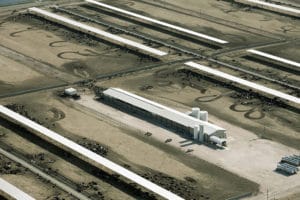USDA’s Proposed Origin of Livestock Rule Could Create New Loophole
by Will Fantle
 |
| The origin of livestock regulations allowed industrial- scale organic dairies to purchase conventional stock to replace worn out milk cows. Aurora Coldwater Dairy, above, manages 18,000 cows on 3,558 acres in Stratford, Texas, according to state filings. |
The USDA’s National Organic Program released the long-awaited proposed rule amending their “Origin of Livestock” regulations — five years after they named it a top priority. The new rule is supposed to close a giant loophole allowed by the USDA’s interpretation of federal regulations.
The loophole has allowed organic factory farms to constantly bring conventional young stock onto their operations to both grow the dairy operations and replace animals burned out by their high production management approach.
The situation has long outraged ethical family-scale organic dairy farmers whose management practices produce self-sustaining dairy herds. These farmers and their supporters have been pressuring the National Organic Program (NOP) to eliminate the loophole for the past decade.
The organic standards, as designed, prevent dairy producers from using antibiotics and other drugs. These prohibitions make it incumbent upon farmers to create a healthy environment for their herd and not push to maximize production, which exponentially increases stress on the animals.
The industrial-scale dairies subvert this principle, some pushing their cows for 25,000 pounds or more of milk production per year, a precursor for mastitis (udder infection) and other maladies. Their management solution has been to import conventional replacements for the sick and lower-producing animals, and “convert” them to organic on a continuous basis.
“Industrial-scale dairies, or ‘factory farms,’ generally in the desert West, have gamed the system and competitively disadvantaged the family farmers who milk cows and follow the spirit and letter of the law,” explains Mark A. Kastel, Cornucopia’s Senior Farm Policy Analyst.
“These dairies burn out their cattle and send them to the hamburger plant, sometimes just a year or two after they start milking them, and then replace them with conventional cows,” Kastel continued. “This undermines the integrity of the organic label.”
To meet the demand from these factory farms for replacement animals, wholesale suppliers of organic heifers (young cows who have not yet calved for the first time) have arisen. These organic heifer farms generally purchase one-year-old conventionally raised yearlings. These animals were typically raised on “medicated” milk replacer (infant formula for bovines) that includes antibiotics and other materials banned in organics. After weaning, the young animals’ diet generally consists of conventional feed, treated with toxic agrochemicals, and almost undoubtedly all genetically engineered (practices prohibited in organics). The heifer ranches, who purchase the young stock, then manage the cows as organic from this point on in their lives until their eventual sale to the large factory farms.
The new proposal by the USDA theoretically tightens the rule by banning the heifer ranches that are converting and raising conventional cows and selling them, by the thousands. Instead, all cattle, as was the intent of the original regulations, must be managed on organic feed, and without banned drugs, from the last third of gestation (meaning, prior to birth).
Under the proposal, farmers would still be allowed, as they are now, to convert an existing herd of milk cows and their young offspring to organic status by providing them qualified organic feed, and shunning any of the prohibited pharmaceuticals, for one year before they officially sell their milk as certified organic. This is a one-time conversion under the law.
But here’s the catch. The problem is what the USDA proposal defines as a dairy farm. “I wish I was making this up,” Kastel said. “To qualify as a dairy all you have to do is milk one cow. One. And you never have to ship any milk. You don’t really need to be a commercial dairy farm.”
The Cornucopia Institute is concerned that agribusiness players will continue to game the system by creating, on a continual basis, new faux dairy “farms,” milking one organic cow and never even selling the milk. But these farms could each have thousands of young conventional heifers, and then sell the entire herd of newly converted heifers to factory farm customers. This process could start over each year with new ownership “on paper,” thus qualifying them to convert subsequent herds on a “one-time basis.”
“The proposed USDA regulations, allowing conventional herds to transition to organic production in one year, need to be prescriptive to avoid abuse that will directly affect the pay price and family income of dairy producers,” notes Ed Maltby, a respected organic dairy industry expert and executive director of the Northeast Organic Dairy Producers Alliance.
“By specifying that the organic certificate holder is the recipient of a one-time exemption, allowing conventional animals to become organically certified in one year, the USDA has opened the door to individuals and corporations exploiting this exception by using conventional dairy livestock to continually start new organic dairies,” Maltby added.
If this all sounds rather complex and deep in the weeds, it is. But the facts are that those hungry to meet the strong consumer demand for wholesome organic foods are willing to bend the rules to get a share of the pie. And they are constantly looking for loopholes.
Given this reality, Cornucopia is asking the USDA to close the new loophole before it is exploited and creates another mess that cheats both consumers and ethical family farmers.
To help protect organics, go to Cornucopia’s action alert which helps farmers and consumers submit comments to the USDA on the new proposal by the July 27 deadline.
This story was previously published in the Summer 2015 Cultivator, Cornucopia’s quarterly newsletter.

